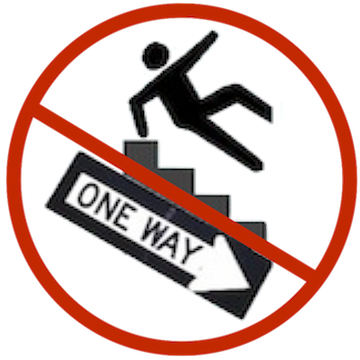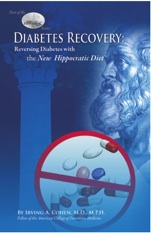Brought to you jointly by The Foundation for Prevention and Dr. Irving A. Cohen
KEY TOPICS AND QUICK LINKS:
Fortunately, Type 2 Diabetes is reversible for many people, In the United States, most diabetics are Type 2. Only about 1 in 20 have Type 1 diabetes, which takes a different course. Type 2 diabetics have a progressive but usually reversible condition known whose cause has been recognized for going back to ancient India. Dietary patterns were known that far back as the underlying cause of many cases of diabetes or prameha. Scientifically based diets to reverse diabetes were available in late 19th century Europe. American research in the early 20th century added to that knowledge. The discovery and availability of insulin beginning in the 1920s was a landmark development. Insulin injections provided a second line of treatment to people who did not respond to dietary, change, but dietary treatment was preferred first.

KEY TOPICS AND QUICK LINKS:
What if I am already diabetic?
Fortunately, Type 2 Diabetes is reversible for many people, In the United States, most diabetics are Type 2. Only about 1 in 20 have Type 1 diabetes, which takes a different course. Type 2 diabetics have a progressive but usually reversible condition known whose cause has been recognized for going back to ancient India. Dietary patterns were known that far back as the underlying cause of many cases of diabetes or prameha. Scientifically based diets to reverse diabetes were available in late 19th century Europe. American research in the early 20th century added to that knowledge. The discovery and availability of insulin beginning in the 1920s was a landmark development. Insulin injections provided a second line of treatment to people who did not respond to dietary, change, but dietary treatment was preferred first.
The diabetes pioneer, Dr. Elliot Joslin described how well diabetics could reverse their condition and stay under control for decades simply by eating healthy diets, such as salads with salmon. However, dietary control seem less important beginning in the late 1980's. Oral medication (instead of insulin) for diabetes had been available in Europe, but it was slower reaching the United States. Once available, it became a panacea. Treatment changed to using drugs from the very beginning, attempting to bring sugar levels under better control and the recently developed A1c test could show when a diabetic was seemingly in good control.
That approach had a dark side. As more medication was used, dangerous hypoglycemic events of low blood sugar were more likely to occur. Consumption of food and use of energy may vary from day-to-day, so too little medication one day may become too much the next day. The same problem had occurred earlier using insulin, but if necessary, insulin users could be taught to vary their injected dose as needed. This did not happen using pills. In both the United States and the United Kingdom, clinical research intended to save lives had to be stopped because it caused new deaths. Aggressive medication use had caused a 25% increase in death by strokes triggered by hypoglycemic episodes!
 Recommended dietary intake was actually increased! Although this reduced the episodes of hypoglycemia, it also increased blood sugar levels. The response was to then add more medication. Today, it is common to see Type 2 diabetics on multiple medications, with this progressing the longer they are treated. This discouraging progression has led many diabetics to the false belief that Type 2 diabetes is a one-way street, progressively getting worse.
Recommended dietary intake was actually increased! Although this reduced the episodes of hypoglycemia, it also increased blood sugar levels. The response was to then add more medication. Today, it is common to see Type 2 diabetics on multiple medications, with this progressing the longer they are treated. This discouraging progression has led many diabetics to the false belief that Type 2 diabetes is a one-way street, progressively getting worse.
Today, many type 2 diabetics now spend thousands of dollars yearly for their medication, yet their diabetes still progresses. Is there an answer to this? Yes, Type 2 Diabetes is not a one-way downhill street. Recommendations today by so-called authorities call for a permissive dietary approach, requiring the use of more and more pharmaceuticals! Reversing this disease requires different approach, returning to diet as a first choice. This common sense approach can be even more effective than in the past. Today's technology, monitoring A1c for long-term evaluation and using a home glucose monitor for immediate feedback lets people understand the true impact of their dietary choice. Diabetics can control their own destiny.
One important caution is for those already on medication! An effective program means a major change in the way a diabetic will be eating. Anyone already on diabetic medication must reduce or stop these under supervision of a physician and from the very beginning, to prevent dangerous hypoglycemia. (In my own experience I have all diabetics who are reducing medication agree to test their blood sugar 4 times a day until they stabilize and to notify immediately me of any unusual results.) Reducing diabetic medication safely should not be a do-it-yourself project.
You can learn more by reading Dr. Cohen's book Diabetes Recovery, which is available by clicking here .
Some things you should know
Your purchase of books or courses at this website will help fund the Foundation for Prevention in its work.
Thank You.
Thank You.

